2009年考研英语阅读理解题精读篇第二篇
2009考研英语阅读理解精选试题及答案解析
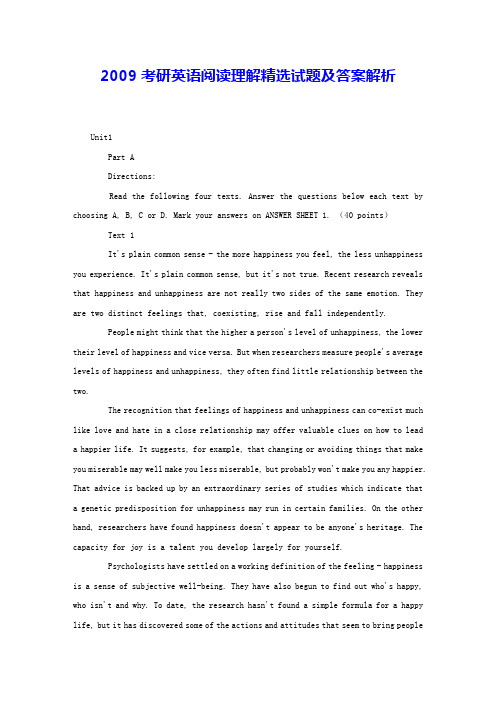
2009考研英语阅读理解精选试题及答案解析Unit1Part ADirections:Read the following four texts. Answer the questions below each text by choosing A, B, C or D. Mark your answers on ANSWER SHEET 1. (40 points)Text 1It's plain common sense - the more happiness you feel, the less unhappiness you experience. It's plain common sense, but it's not true. Recent research reveals that happiness and unhappiness are not really two sides of the same emotion. They are two distinct feelings that, coexisting, rise and fall independently.People might think that the higher a person's level of unhappiness, the lower their level of happiness and vice versa. But when researchers measure people's average levels of happiness and unhappiness, they often find little relationship between the two.The recognition that feelings of happiness and unhappiness can co-exist much like love and hate in a close relationship may offer valuable clues on how to lead a happier life. It suggests, for example, that changing or avoiding things that make you miserable may well make you less miserable, but probably won't make you any happier. That advice is backed up by an extraordinary series of studies which indicate that a genetic predisposition for unhappiness may run in certain families. On the other hand, researchers have found happiness doesn't appear to be anyone's heritage. The capacity for joy is a talent you develop largely for yourself.Psychologists have settled on a working definition of the feeling - happiness is a sense of subjective well-being. They have also begun to find out who's happy, who isn't and why. To date, the research hasn't found a simple formula for a happy life, but it has discovered some of the actions and attitudes that seem to bring peoplecloser to that most desired of feelings.Why is unhappiness less influenced by environment? When we are happy, we are more responsive to people and keep up connections better than when we are feeling sad. This doesn't mean, however, that some people are born to be sad and that's that. Genes may predispose one to unhappiness, but disposition can be influenced by personal choice. You can increase your happiness through your own actions.1. According to the text, it is true thatA.unhappiness is more inherited than affected by environment.B.happiness and unhappiness are mutually conditional.C.unhappiness is subject to external more than internal factors.D.happiness is an uncontrollable subjective feeling.2. The author argues that one can achieve happiness byA. maintaining it at an average level.B.escaping miserable occurrences in life.C.pursuing it with one's painstaking effort.D.realizing its coexistence with unhappiness.3. The phrase "To date" (Par.4) can be best replaced byA.As a result.B.In addition.C.At present.D.Until now.4. What do you think the author believes about happiness and unhappiness?A.One feels unhappy owing to his miserable origin.B.They are independent but existing concurrentlyC.One feels happy by participating in more activities.D.They are actions and attitudes taken by human beings.5. The sentence "That's that" (Par. 5) probably means: Some people are born to be sadA.and the situation cannot be altered.B.and happiness remains inaccessible.C.but they don't think much about it. D.but they remain unconscious of it.。
2009年考研英语阅读理解全文翻译.doc
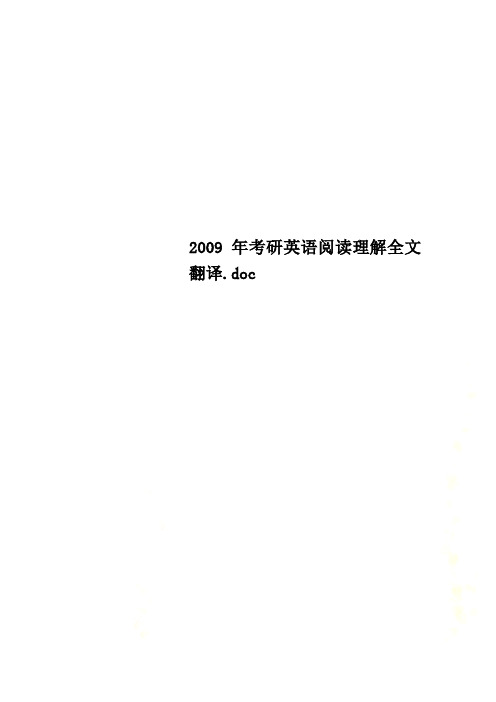
2009年考研英语阅读理解全文翻译.docText1Habits are a funny thing. We reach for them mindlessly, setting our brains on auto-pilot and relaxing into the unconscious comfort of familiar routine. “Not choice, but habit rules the unreflecting herd,” William Wordsworth sai d in the19th century. In the ever-changing 21st century, even the word “habit” carries a negative connotation. So it seems antithetical to talk about habits in the same context as creativity and innovation.习惯是件有趣的事情。
我们无意识间养成了一些习惯,我们的大脑是自动运转的,轻松进入熟知套路所带来的不自觉舒适状态。
“这并非选择,而是习惯控制了那些没有思想的人”,这是威廉•华兹华斯(William Wordsworth)19世纪时说的话。
在现在这个日新月异的21世纪,甚至习惯这个词本身也带有负面涵义。
因此,在创造和革新的背景下来谈论习惯,似乎显得有点矛盾。
But brain researchers have discovered that when we consciously develop new habits, we create parallel synaptic paths, and even entirely new brain cells, that can jump our trains of thought onto new, innovative tracks. But don’t bother trying to kill off old habits; once those ruts of procedure are worn into the hippocampus, they’re there to stay. Instead, the new habits we deli berately ingrain into ourselves create parallel pathways that can bypass those old roads.但大脑研究人员发现,当我们有意识地培养新的习惯的时候,我们创建了平行路径,甚至是全新的脑细胞,可以让我们的思路跳转到新的创新轨道上来。
2009考研英语阅读理解精读100篇(3)
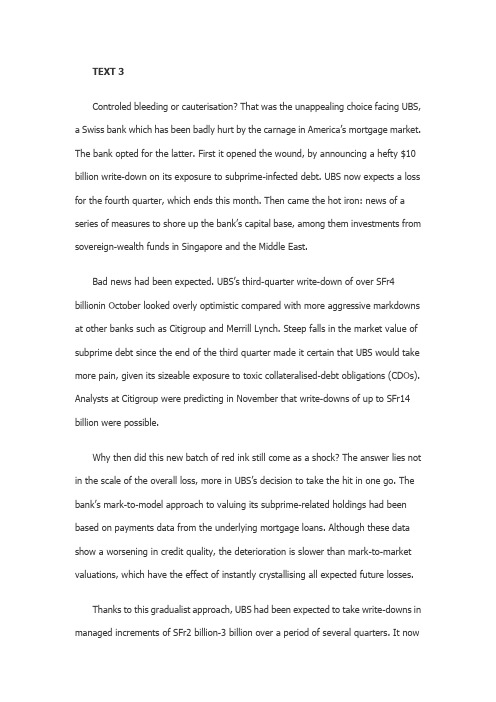
TEXT 3Controled bleeding or cauterisation? That was the unappealing choice facing UBS, a Swiss bank which has been badly hurt by the carnage in America’s mortgage market. The bank opted for the latter. First it opened the wound, by announcing a hefty $10 billion write-down on its exposure to subprime-infected debt. UBS now expects a loss for the fourth quarter, which ends this month. Then came the hot iron: news of a series of measures to shore up the bank’s capital base, among them investments from sovereign-wealth funds in Singapore and the Middle East.Bad news had been expected. UBS’s third-quarter write-down of over SFr4 billionin October looked overly optimistic compared with more aggressive markdowns at other banks such as Citigroup and Merrill Lynch. Steep falls in the market value of subprime debt since the end of the third quarter made it certain that UBS would take more pain, given its sizeable exposure to toxic collateralised-debt obligations (CDOs). Analysts at Citigroup were predicting in November that write-downs of up to SFr14 billion were possible.Why then did this new batch of red ink still come as a shock? The answer lies not in the scale of the overall loss, more in UBS’s decision to take the hit in one go. The bank’s mark-to-model approach to valuing its subprime-related holdings had been based on payments data from the underlying mortgage loans. Although these data show a worsening in credit quality, the deterioration is slower than mark-to-market valuations, which have the effect of instantly crystallising all expected future losses.Thanks to this gradualist approach, UBS had been expected to take write-downs in managed increments of SFr2 billion-3 billion over a period of several quarters. It nowappears that the bank has incorporated market values into its model, sending its fourth-quarter write-downs into orbit. The change of approach may be on the advice of auditors and regulators but it is more likely to reflect a desire by UBS’s bosses to avoid months of speculation about the bank’s exposure, something that Marcel Rohner, the chief executive, described as “distracting”.In a particular indignity for a bank long associated with conservatism, concerns about the level of UBS’s capital ratio had even started to surface. Hence the moves to strengthen its tier-one capital, an important measure of bank solidity, by SFr19.4 billion, a great deal more than the write-down. The majority of that money will come from sovereign-wealth funds, the white knights of choice for today’s bank in distress. Singapore’s GIC, which manages the city-state’s foreign reserves, has pledged to buy SFr11 billion-worth of convertible bonds in UBS; an unnamed Middle Eastern investor will put in a further SFr2 billion. UBS will also raise money by selling treasury shares, and save cash by issuing its 2007 dividend in the form of shares. Its capital ratio is expected to end up above 12% in the fourth quarter, a strong position.The majority of that money will come from sovereign-wealth funds, the white knights of choice for today’s bank in distress.Hopeful talk of lines being drawn under the subprime crisis has been a feature of banks’ quarterly reporting since September. Marrying bigger-than-expectedwrite-downs with bigger-than-expected boosts to capital looks like the right treatment in this environment. But UBS still cannot be sure that its problems are over. Further deterioration in its subprime asset values is possible; the broader economic impact of the credit crunch is unclear; and the damage to the bank’s reputat ion cannot yet be quantified. The patient still needs watching.1. The author uses the metaphor “hot iron” to imply that_____.[A] those measures will do more harm to UBS.[B] those measures will cauterize UBS.[C] those measures will forcefully stop UBS from furthur loss.[D] those measures will control bleeding of UBS.2. Compared with the mark-to-market valuations, the mark-to-model approach could _____.[A] slow down the worsening in credit qualtiy.[B] instantly crystallise all expected future loss.[C] worsen the credit quality.[D] accelerate the deterioration in credit quality.3. The reason that Marcel Rohner thought the chang of approach was “distracting” is _____.[A] this change was unexpected to take place in such a situation.[B] this change was result of the advice of auditors and regulators.[C] this change was unfavorite to UBS.[D] this change was taken to make people dispel their guess.4. The phrase “the white knights”(Line 5, Paragraph 5) most probablymeans____.[A] rich people.[B] saviors.[C] generous people.[D] brave people.5. The author’s attitude towards UBS’s future is______.[A] optimistic[B] pessimistic[C] uncertain[D] none of the above篇章分析:本篇文章介绍了UBS银行目前面临的困境以及其解决困境的一系列措施。
2009考研英语阅读理解精读(二)
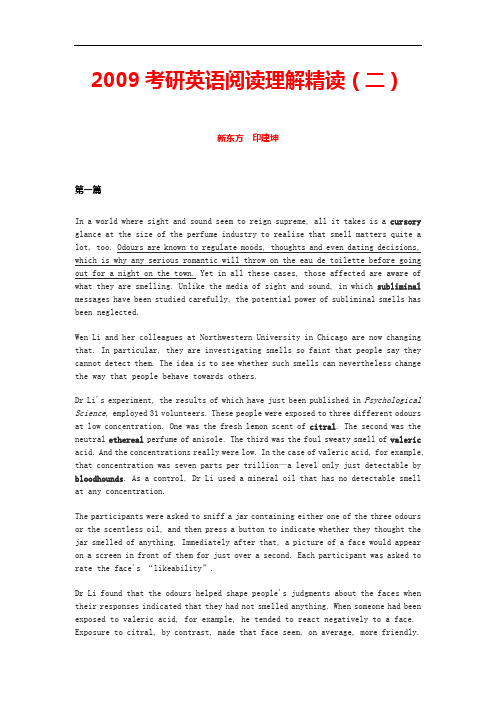
2009考研英语阅读理解精读(二)新东方印建坤第一篇In a world where sight and sound seem to reign supreme, all it takes is a cursory glance at the size of the perfume industry to realise that smell matters quite a lot, too. Odours are known to regulate moods, thoughts and even dating decisions, which is why any serious romantic will throw on the eau de toilette before going out for a night on the town. Yet in all these cases, those affected are aware of what they are smelling. Unlike the media of sight and sound, in which subliminal messages have been studied carefully, the potential power of subliminal smells has been neglected.Wen Li and her colleagues at Northwestern University in Chicago are now changing that. In particular, they are investigating smells so faint that people say they cannot detect them. The idea is to see whether such smells can nevertheless change the way that people behave towards others.Dr Li's experiment, the results of which have just been published in Psychological Science, employed 31 volunteers. These people were exposed to three different odours at low concentration. One was the fresh lemon scent of citral. The second was the neutral ethereal perfume of anisole. The third was the foul sweaty smell of valeric acid. And the concentrations really were low. In the case of valeric acid, for example, that concentration was seven parts per trillion—a level only just detectable by bloodhounds. As a control, Dr Li used a mineral oil that has no detectable smell at any concentration.The participants were asked to sniff a jar containing either one of the three odours or the scentless oil, and then press a button to indicate whether they thought the jar smelled of anything. Immediately after that, a picture of a face would appear on a screen in front of them for just over a second. Each participant was asked to rate the face's “likeability”.Dr Li found that the odours helped shape people's judgments about the faces when their responses indicated that they had not smelled anything. When someone had been exposed to valeric acid, for example, he tended to react negatively to a face. Exposure to citral, by contrast, made that face seem, on average, more friendly.(Obviously, the same face was not shown to any given participant more than once.) Even more intriguing, however, was that when participants did consciously perceive a smell, its effect on face-perception disappeared.What is going on is unclear. If smells can carry useful information about personality (which is possible), then the effect would be expected to be the same whether or not the chemical in question is detected subliminally. If they do not carry such information, then it is hard to see what use the subliminal reaction is. Nevertheless, it is there.The findings do, however, demonstrate what might be a powerful method of manipulation. Indeed, Dr Li considers the potential uses to be vast. Business meetings might be made more pleasant by releasing appropriate fragrances into the air in unsmellable amounts. Conversely, fights might be started by putting people in the presence of a faint foul odour. Advertising hoardings might benefit from a little olfactory tweaking and cinema audiences could be reduced to floods of tears at the appropriate moment. The sweet smell of success might, in other words, actually be undetectable.1. Dr. Li is carrying out such an investigation in order to _____.[A] find out how smells regulate moods in a subtle and nuanced way[B] prove that smell plays an equally important role in daily life as that of sight and sound[C] find out if people are sensitive to faint smells[D] find out if faint smells could influence people’s judgement of others2.The mineral oil is used in Dr. Li’s experiment to _____.[A] control the concentration of odours in a slightly detectable degree[B] act as a group of comparison with that of the other smells[C] regulate the participants’ moods by decreasing the smell’s concentration[D] protect the participants from losing sense of smell3. The word “likeability” (Line 3, Paragraph 4) most probably means_____.[A] similarity[B] likeness[C] loveliness[D] likelihood4. When the participants conciously smelt the valeric acid, they tended to_____.[A] make negative judgement to a face[B] make positive judgement to a face[C] make biased judgement to a face[D] make fair judgement to a face5. From Dr. Li’s experiment, it can be infered that_____.[A] one’s reaction to subliminal smells reflect useful information about his or her personality[B] subliminal smells can influence people’s interaction with each other[C] subliminal smells have no effect on people’s conscious face-perception.[D] subliminal smells turn out to be a means of powerful manipulation in terms of business success.文章剖析:这篇文章介绍了细微气味对人们的影响。
2009年考研英语阅读理解精读100篇(高分版)TEXT10

在经过半年多时间的痛苦创作之后,我也可以长长的松⼀⼝⽓,如期向我的学⽣们兑现6⽉份来我博客免费下载《2009考研英语阅读理解精读100篇(⾼分版)》的了。
本书共分为25个单元,每个单元有4篇⽂章,难度偏⾼。
主要适合的考研⼈群为业已通过四级考试并希望能在考研英语考试中考取70分以上成绩的考⽣。
希望考研的XDJM们再接再厉,每个⼈都能取得好成绩。
TEXT TEN A boy or a girl? That is usually the first question asked when a woman gives birth. Remarkably, the answer varies with where the mother lives. In rich countries the chances of its being a boy are about 5% higher than in poor ones. Equally remarkably, that figure has been falling recently. Several theories have been put forward to explain these observations. Some argue that smoking plays a role, others that diet may be important. Neither of these ideas has been supported by evidence from large studies. But new research points to a different factor: stress. Strange as it might seem, the terrorist attacks of September 11th 2001 shed light on the enigma. Studies noting the sex of babies conceived in New York during the week of the attacks found a drop in the ratio of males to females. That is consistent with earlier studies, which revealed a similar shift in women who became pregnant during floods and earthquakes and in time of war. Moreover, a study carried out eight years ago by researchers at the University of Aarhus, in Denmark, revealed that women who suffered the death of a child or spouse from some catastrophic illness around the time they conceived were much more likely to give birth to girls than to boys. Taken together, these results suggest that acute stress to a woman at the time of conception shifts the sex ratio towards girls. However, Carsten Obel, a researcher at Aarhus who was not involved in the earlier study, wondered if the same might be true of chronic stress too. In a paper just published in Human Development, he shows that it is. Dr Obel used a set of data collected between 1989 and 1992. During that period 8,719 expectant mothers were asked to fill in questionnaires that inquired, among other things, about their level of stress. Dr Obel found that the more stressed a mother had been, the less chance she had of having given birth to a boy. Only 47% of children born to women in the top quartile of stress were males. That compared with 52% for women in the bottom quartile. Dr Obel suspects the immediate cause is that male pregnancies are more likely to miscarry in response to stress than female pregnancies are, especially during the first three months. However, that is difficult to prove. More intriguing, though, is the ultimate cause, for he thinks it might be adaptive, rather than pathological. That is because the chances are that a daughter who reaches adulthood will find a mate and thus produce grandchildren. A son is a different matter. Healthy, strapping sons are likely to produce lots of grandchildren, by several women-or would have done in the hunter-gatherer societies in which most human evolution took place. Weak ones would be marginalised and maybe even killed in the cut and thrust of male competition. If a mother’s stress adversely affects the development of her fetus then selectively aborting boys, rather than wasting time and resources on bringing them to term, would make evolutionary sense. That, in turn, would explain why women in rich countries, who are less likely to suffer from hunger and disease, are more likely to give birth to sons. That this likelihood is, nevertheless, falling suggests that rich women’s lives may be more stressful than they used to be. 1. The author begins the passage by_____. [A] presenting an argumentation [B] explaining a phenomenon [C] raising a question [D] making a comparison 2. The ratio of giving birth to a boy is falling in rich countries because_____. [A] the terrorist attacks of September 11th 2001 exerted huge negative impact [B] women are facing greater pressure than past [C] women are under new pressure now which they seldom faced in the past [D] male pregnancies are more easily to miscarry 3. Which of the following can explain Dr Obel’s opinion that the ultimat cause is adaptive rather than pathological? [A] 47% of children born to women in the top quartile of stress were males while 52% in the bottom quartile. [B] Women in rich countries are more likely to give birth to boys [C] Women selectively abort boys rather than waste time and resources on bringing them to term for fear of male competition. [D] Women who suffer from calamity in conception are more likely to give birth to girls. 4. Women in the hunter-gatherer societies are more likely to give birth to daughters because_____. [A] they agree that giving birth to daughters is beneficial in the evolutionary sense [B] sons are likely to produce lots of grandchildren with several women [C] they think it is a better practice for a daughter to produce grandchildren with only one mate [D] they think bringing sons to term is wasting time and resources. 5.From this passage, we may draw a conclusion that_____. [A] acute stress is more likely to cause women to choose aborting boys than chronic stress. [B] stress to a woman at the time of conception, whether acute or chronic, will shift the sex ratio towards girls. [C] more girls will be born in the future because today’s women, in both rich and poor countries, suffer from increasing pressure. [D] chronic stress is more decisive in influencing the women’s pregnancies. ⽂章剖析: 这篇⽂章是介绍影响婴⼉出⽣性别原因的⼀个新的研究成果--压⼒。
2009年考研英语二真题全文翻译答案超详解析(原MBA)
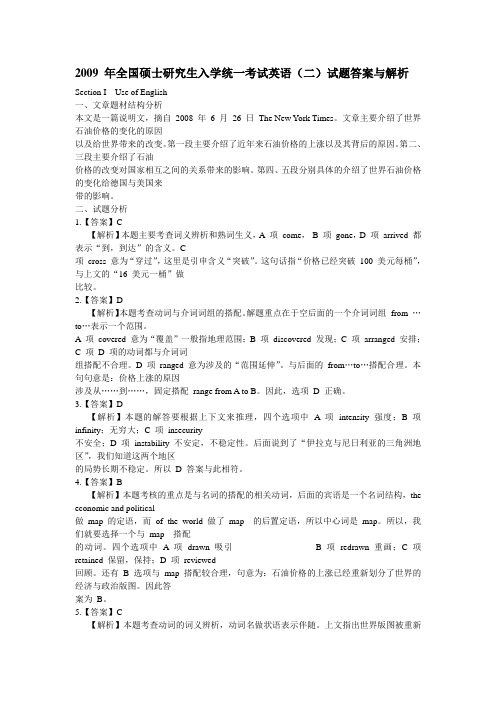
2009 年全国硕士研究生入学统一考试英语(二)试题答案与解析Section I Use of English一、文章题材结构分析本文是一篇说明文,摘自2008 年 6 月26 日The New York Times。
文章主要介绍了世界石油价格的变化的原因以及给世界带来的改变。
第一段主要介绍了近年来石油价格的上涨以及其背后的原因。
第二、三段主要介绍了石油价格的改变对国家相互之间的关系带来的影响。
第四、五段分别具体的介绍了世界石油价格的变化给德国与美国来带的影响。
二、试题分析1.【答案】C【解析】本题主要考查词义辨析和熟词生义,A 项come,B 项gone,D 项arrived 都表示“到,到达”的含义。
C项cross 意为“穿过”,这里是引申含义“突破”。
这句话指“价格已经突破100 美元每桶”,与上文的“16 美元一桶”做比较。
2.【答案】D【解析】本题考查动词与介词词组的搭配。
解题重点在于空后面的一个介词词组from …to…表示一个范围。
A 项covered 意为“覆盖”一般指地理范围;B 项discovered 发现;C 项arranged 安排;C 项D 项的动词都与介词词组搭配不合理。
D 项ranged 意为涉及的“范围延伸”。
与后面的from…to…搭配合理。
本句句意是:价格上涨的原因涉及从……到……,固定搭配range from A to B。
因此,选项D 正确。
3.【答案】D【解析】本题的解答要根据上下文来推理,四个选项中 A 项intensity 强度;B 项infinity;无穷大;C 项insecurity不安全;D 项instability 不安定,不稳定性。
后面说到了“伊拉克与尼日利亚的三角洲地区”,我们知道这两个地区的局势长期不稳定。
所以D 答案与此相符。
4.【答案】B【解析】本题考核的重点是与名词的搭配的相关动词,后面的宾语是一个名词结构,the economic and political做map 的定语,而of the world 做了map 的后置定语,所以中心词是map。
2009年考研英语阅读理解题精读篇第二篇

TEXT 2He emerged, all of a sudden, in 1957: the most explosive new poetic talent of the English post-war era. Poetry specialised, at that moment, in the wry chronicling of the everyday. The poetry of Yorkshire-born Ted Hughes, first published in a book called “The Hawk in the Rain” when he was 27, was unlike anything written by his immediate predecessors. Driven by an almost Jacobean rhetoric, it had a visionary fervour. Its most eye-catching characteristic was Hughes’s ability to get beneath the skins of animals: foxes, otters, pigs. These animals were the real thing all right, but they were also armorial devices—symbols of the countryside and lifeblood of the earth in which they were rooted. It gave his work a raw, primal stink.It was not only England that thought so either. Hughes’s book was also published in America, where it won the Galbraith prize, a major literary award. But then, in 1963, Sylvia Plath, a young American poet whom he had first met at Cambridge University in 1956, and who became his wife in the summer of that year, committed suicide. Hughes was vilified for long after that, especially by feminists in America. In 1998, the year he died, Hughes broke his own self-imposed public silence about their relationship in a book of loose-weave poems called “Birthday Letters”.In this new and exhilarating collection of real letters, Hughes returns to the issue of his first wife’s death, which he calls his “big and unmanageable event”. He felt his talent muffled by the perpetual eavesdropping upon his every move. Not until he decided to publish his own account of their relationship did the burden begin to lighten.The analysis is raw, pained and ruthlessly self-aware. For all the moral torment, the writing itself has the same rush and vigour that possessed Hughes’s early poetry. Some books of letters serve as a personalised historical chronicle. Poets’letters are seldom like that, and Hughes’s are no exception. His are about a life of literary engagement: almost all of them include some musing on the state or the nature of writing, both Hughes’s own or other people’s. The trajectory of Hughes’s literary career had him moving from obscurity to fame, and then, in the eyes of many, to life-long notoriety. These letters are filled with his wrestling with the consequences of being the part-private, part-public creature that he became, desperate to devote himself to his writing, and yet subject to endless invasions of his privacy.Hughes is an absorbing and intricate commentator upon his own poetry, even when he is standing back from it and good-humouredly condemning himself for “its fantasticalia, its pretticisms and its infinite verballifications”. He also believed, from first to last, that poetry had a special place in the education of children. “What kids need”, he wrote in a 1988 letter to the secretary of state for education in the Conservative government, “is a headfull [sic] of songs that are not songs but blocks of refined and achieved and exemplary language.” When that happens, children have “the guardian angel installed behind the tongue”. Lucky readers, big or small.1.The poetry of Hughes’s forerunners is characteristic of ______[A] its natural, crude flavor.[B] its distorted depiction of people’s daily life.[C] its penetrating sight.[D] its fantastical enthusiasm.2.The word “vilified” (Line 3, Paragraph 2)most probably means _____[A] tortured[B] harassed[C] scolded[D] tormented3.According to the third paragraph, Hughes’s collection of letters are _____[A] personal recollection of his life.[B] personalised historical chronicle of his literary engagement.[C] reflections of his struggle with his devotion and the reality.[D] his meditation on the literary world.4. From the letters, we may find the cause of Hughes’s internal struggle is _____[A] his devotion to the literary world.[B] that he is a part-private, part-public creature.[C] that he is constrained by the fear of his privacy being invaded.[D] his fame and notoriety.5. By “lucky readers” in the last sentence, the author means_____[A] children who read poetry.[B] children who have a headfull of songs.[C] children who own blocks of refined and achieved and exemplary language.[D] children who have the guardian angel installed behind the tongue。
2009考研英语阅读

2009考研英语阅读
在2009年的考研英语考试中,阅读理解部分占据了相当重要的比重,
它不仅考察了考生的词汇量和语法知识,还考察了考生的逻辑推理和
信息提取能力。
对于准备考研的学生来说,掌握有效的阅读技巧和策
略是至关重要的。
首先,考生需要广泛阅读各种类型的英文材料,包括但不限于学术文章、新闻报道、评论和小说。
这样可以提高对不同文体和语言风格的
适应能力,同时也能扩大词汇量和增强语言感知力。
其次,练习快速阅读和略读技巧。
在考试中,时间是非常宝贵的资源,因此考生需要学会如何迅速抓住文章的主旨和关键信息。
这可以通过
练习寻找段落的主题句、识别关键词和转折词等方法来实现。
此外,理解文章的逻辑结构同样重要。
考生应该学会识别文章中的论点、论据和结论,以及它们之间的逻辑关系。
这样在回答问题时,就
能更准确地定位信息,提高答题的准确性。
在练习阅读理解时,考生还应该注意培养自己的批判性思维能力。
这
意味着不仅要理解作者的观点,还要能够分析和评价这些观点的合理
性和有效性。
最后,定期进行模拟测试也是提高阅读理解能力的有效方法。
通过模
拟测试,考生可以熟悉考试的流程和时间限制,同时也能检验自己的
阅读速度和理解能力。
总之,2009年考研英语的阅读理解部分要求考生具备扎实的语言基础、
良好的阅读技巧和批判性思维能力。
通过系统的训练和不断的实践,考生可以提高自己的阅读水平,从而在考试中取得理想的成绩。
- 1、下载文档前请自行甄别文档内容的完整性,平台不提供额外的编辑、内容补充、找答案等附加服务。
- 2、"仅部分预览"的文档,不可在线预览部分如存在完整性等问题,可反馈申请退款(可完整预览的文档不适用该条件!)。
- 3、如文档侵犯您的权益,请联系客服反馈,我们会尽快为您处理(人工客服工作时间:9:00-18:30)。
2009年考研英语阅读理解题精读篇第二篇TEXT 2He emerged, all of a sudden, in 1957: the most explosive new poetic talent of the English post-war era. Poetry specialised, at that moment, in the wry chronicling of the everyday. The poetry of Yorkshire-born Ted Hughes, first published in a book called "The Hawk in the Rain" when he was 27, was unlike anything written by his immediate predecessors. Driven by an almost Jacobean rhetoric, it had a visionary fervour. Its most eye-catching characteristic was Hughes's ability to get beneath the skins of animals: foxes, otters, pigs. These animals were the real thing all right, but they were also armorial devices-symbols of the countryside and lifeblood of the earth in which they were rooted. It gave his work a raw, primal stink.It was not only England that thought so either. Hughes's book was also published in America, where it won the Galbraith prize, a major literary award. But then, in 1963, Sylvia Plath, a young American poet whom he had first met at Cambridge University in 1956, and who became his wife in the summer of that year, committed suicide. Hughes was vilified for long after that, especially by feminists in America. In 1998, the year he died, Hughes broke his own self-imposed public silence about their relationship in a book of loose-weave poems called "Birthday Letters".In this new and exhilarating collection of real letters, Hughes returns to the issue of his first wife's death, which he calls his "big and unmanageable event". He felt his talent muffled by the perpetual eavesdropping upon his every move. Not until he decided to publish his own account of their relationship did the burden begin to lighten.The analysis is raw, pained and ruthlessly self-aware. For all the moral torment, the writing itself has the same rush and vigour that possessed Hughes's early poetry. Some books of letters serve as a personalised historical chronicle. Poets' letters are seldom like that, and Hughes's are no exception. His are about a life of literary engagement: almost all of them include some musing on the state or the nature ofwriting, both Hughes's own or other people's. The trajectory of Hughes's literary career had him moving from obscurity to fame, and then, in the eyes of many, to life-long notoriety. These letters are filled with his wrestling with the consequences of being the part-private, part-public creature that he became, desperate to devote himself to his writing, and yet subject to endless invasions of his privacy.Hughes is an absorbing and intricate commentator upon his own poetry, even when he is standing back from it and good-humouredly condemning himself for "its fantasticalia, its pretticisms and its infinite verballifications". He also believed, from first to last, that poetry had a special place in the education of children. "What kids need", he wrote in a 1988 letter to the secretary of state for education in the Conservative government, "is a headfull [sic] of songs that are not songs but blocks of refined and achieved and exemplary language." When that happens, children have "the guardian angel installed behind the tongue". Lucky readers, big or small.1.The poetry of Hughes's forerunners is characteristic of ______[A] its natural, crude flavor.[B] its distorted depiction of people's daily life.[C] its penetrating sight.[D] its fantastical enthusiasm.2.The word "vilified" (Line 3, Paragraph 2)most probably means _____[A] tortured[B] harassed[C] scolded[D] tormented3.According to the third paragraph, Hughes's collection of letters are _____[A] personal recollection of his life.[B] personalised historical chronicle of his literary engagement.[C] reflections of his struggle with his devotion and the reality.[D] his meditation on the literary world.4. From the letters, we may find the cause of Hughes's internal struggle is _____[A] his devotion to the literary world.[B] that he is a part-private, part-public creature.[C] that he is constrained by the fear of his privacy being invaded.[D] his fame and notoriety.5. By "lucky readers" in the last sentence, the author means_____[A] children who read poetry.[B] children who have a headfull of songs.[C] children who own blocks of refined and achieved and exemplary language.[D] children who have the guardian angel installed behind the tongue。
